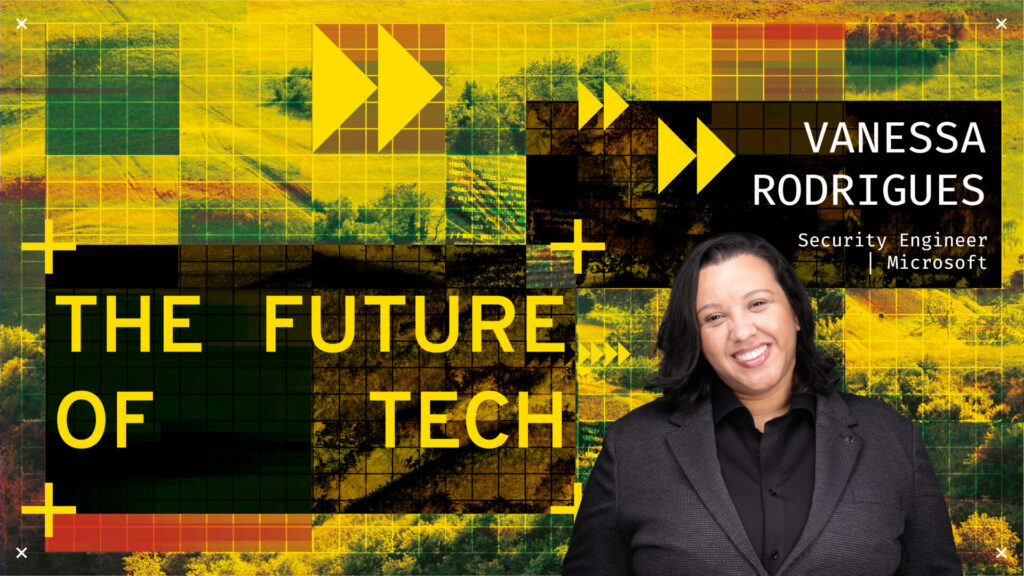When she moved from Brazil to Ireland, Vanessa sought to start a dynamic career that provided growth and stability, which led her to pursue a BSc in Information Technology. During this programme, she was introduced to advanced networking and forensics and discovered her passion for cybersecurity. She identified it as a growing area of technology and a field that has a tangible impact on people and organisations. Vanessa started her post-graduate career as a Cybersecurity Analyst at Dell, and she now works as a Security Engineer at Microsoft.
What are the challenges in cybersecurity at the moment?
A big challenge is keeping up with new threats that emerge daily, especially now with increased focus on data privacy and new regulations like GDPR. It is hard to keep pace with new technologies, threats, and regulations. Even with extra layers of security, most systems still rely in some way on cloud providers. AI has enabled cyberattacks to be more sophisticated and dealing with all that while protecting data is challenging. Data is the most valuable product in the world; it needs to be protected.
How can organisations better protect data?
There is a fascinating emerging technology called decentralised identity, which is a foundational aspect of blockchain technology. It aims to store your data away from big tech companies, giving you full control.

With decentralised identity, that model changes. Instead of storing personal data themselves, organisations can simply verify a customer’s identity or details, like age, address, or credentials, without actually keeping that information. Think of it like checking someone’s ID at the door, but not taking a copy. This reduces the amount of sensitive data a company holds, making it a smaller target for attackers and easier to comply with privacy laws like GDPR. It also builds trust, since users stay in control of their own information.
It’s a technology I would really like to see being rolled out more. I believe in giving people control of their data; they should know where their data is, who is accessing it, and where it’s being shared.
Is there a common practice or belief in cybersecurity that’s now becoming obsolete or changing?
I think perimeter-based security is becoming outdated; the idea that you can protect everything just by securing the edges doesn’t work anymore. People are everywhere now, working from home, using cloud and mobile, so security has to go where the users and the data are. Some say that Zero Trust is a buzzword, but I don’t agree. Zero Trust is now a necessity: never trust, always verify.
Which niche technology or trend in cybersecurity should people pay more attention to?
I am keeping my eye on privacy-enhancing technologies, or PETs, which protect personal data even when it’s being used. For example, in the HSE case about four years ago, attackers stole millions of patient records. If the HSE had used a PET like homomorphic encryption, the data would have stayed encrypted even while in use. The attackers could have stolen the data, but it would have been unreadable, removing the biggest motivation for such attacks.

In everyday life, PETs would make things safer behind the scenes, without changing how we interact with services. For instance, in banking, it could allow fraud detection systems to analyse your transactions for suspicious activity, without actually seeing your full personal or financial information; your privacy is protected, but the system still works.
Another example would be online shopping, instead of handing over much of your personal information, like ID, name, address, etc. You could just confirm you’re over 18 using a secure digital proof. That’s where decentralised identity comes in; it lets you control what personal info you share and when.
PETs protect data while it’s being used, and decentralised identity gives you control before it is shared. You wouldn’t notice a difference in how you use these services, but you would have more privacy and security built into the process, which means fewer data leaks, less fraud, and greater trust.
Has working in cybersecurity and being aware of online threats changed the way you behave online?
Definitely, I joke that it makes me a bit paranoid! With friends and family, I’m always saying: verify everything, never trust blindly. If you get a suspicious text or email, don’t click; call me. I talk about this a lot, and we often question what we should post online and whether our messages are secure. All our chats, WhatsApp, Facebook Messenger, are encrypted, meaning that when you send a message, it’s automatically scrambled into unreadable code while it travels across the internet. Only the person you’re sending it to has the “key” to unlock and read it.
Even the app company (like WhatsApp or Facebook) can’t read your messages. It’s called end-to-end encryption, and it’s designed to keep your conversations private, even if someone tries to intercept them.

Do you think technology can better serve society instead of just making business profits?
I think technology needs to focus more on accessibility and inclusion. Tech should be built for everyone, not just the tech-savvy or those in big cities. In healthcare, for instance, telemedicine can be life-changing for people in rural areas or with mobility issues, but they need access to the right tools and the internet. I would like to see more solutions designed with real people in mind, not just business needs.

Governments have a big role to play in these initiatives. They have the resources, and they have a lot of our data. Our identities are mostly digital now, so they can use that information to make technology more equitable.
What are some of the other positives technology has provided?
From my perspective, we have gained incredible connection speed. We can work from anywhere and stay in touch instantly. Access to information takes seconds, which is great for learning and growth. But the same speed can also spread misinformation, which is dangerous. The faster information spreads, the less time people have to question it. False or misleading content can go viral in minutes, especially when bots are involved. By the time it is corrected (if it ever is), the damage is already done.
I recommend watching a documentary called “What Makes You Click”, which shows how fake news is sometimes created and spread deliberately to manipulate public opinion, often for political or financial gain. The 2018 elections in Brazil were one example, where misinformation spread like wildfire through social media and messaging apps. Technology gave us speed and reach, but we are still figuring out how to handle that responsibly. That’s the challenge.
Do you use those AI tools, and how have they impacted your day-to-day?
At work, we are actively encouraged to use Copilot. Innovation is exciting, but sometimes I feel we rush into things, especially in areas like AI. AI is great; you can get things done faster and more efficiently, and it can make your job easier. However, I wonder if we should slow down a little and think through how AI can be used for good and how it might be misused. Tech often moves much faster than politics and ethics around it. Legal frameworks can take longer to catch up.

AI can also be used to create cyberattacks or manipulate people, which is dangerous. We need to be mindful.
What is the Future of Tech?
I would like to see a future where technology feels less overwhelming and more human, where people don’t need experts to feel safe, included, or in control of their own data. I don’t think technology can solve everything, but with the right intentions, it can make everyday life easier, more equal, and more secure for everyone. That’s the future I see in tech.
Check out all of the interviews in our Future of Tech series here>>> , listen on Spotify>>>> or watch the videos on our LinkedIn page>>>>


 Jump Back
Jump Back

